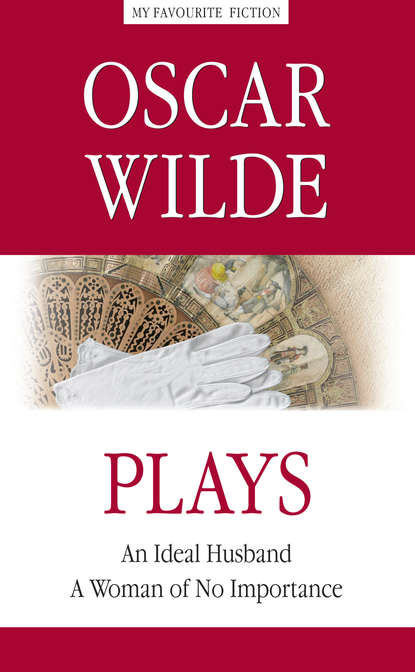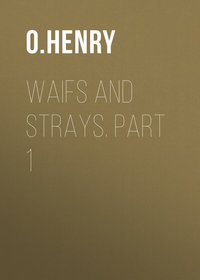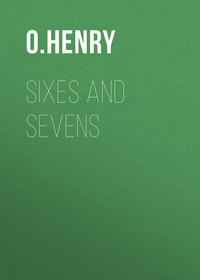
Полная версия
Short Stories / Рассказы

O'Henry / О’Генри
Short Stories / Рассказы
© ООО «Антология», 2012
Ships
Within a week a suitable building had been secured in the Calle Grande, and Mr Hemstetter’s stock of shoes arranged upon their shelves. The rent of the store was moderate; and the stock made a fine showing of neat white boxes, attractively displayed.
Johnny’s friends stood by him loyally. On the first day Keogh strolled into the store in a casual kind of way about once every hour, and bought shoes. After he had purchased a pair each of extension soles, congress gaiters, button kids, low-quartered calfs, dancing pumps, rubber boots, tans of various hues, tennis shoes and flowered slippers, he sought out Johnny to be prompted as to the names of other kinds that he might inquire for. The other English-speaking residents also played their parts nobly by buying often and liberally. Keogh was grand marshal, and made them distribute their patronage, thus keeping up a fair run of custom for several days.
Mr Hemstetter was gratified by the amount of business done thus far; but expressed surprise that the natives were so backward with their custom.
“Oh, they’re awfully shy,” explained Johnny, as he wiped his forehead nervously. “They’ll get the habit pretty soon. They’ll come with a rush when they do come.”
One afternoon Keogh dropped into the consul’s office, chewing an unlighted cigar thoughtfully.
“Got anything up your sleeve?” he inquired of Johnny. “If you have it’s about time to show it. If you can borrow some gent’s hat in the audience, and make a lot of customers for an idle stock of shoes come out of it you’d better spiel. The boys have all laid in enough footwear to last ’em ten years; and there’s nothing doing in the shoe store but dolce far niente.[1] I just came by there. Your venerable victim was standing in the door, gazing through his specs at the bare toes passing by his emporium. The natives here have got the true artistic temperament. Me and Clancy took eighteen tintypes this morning in two hours. There’s been but one pair of shoes sold all day. Blanchard went in and bought a pair of furlined house-slippers because he thought he saw Miss Hemstetter go into the store. I saw him throw the slippers into the lagoon afterwards.”
“There’s a Mobile fruit steamer coming in to-morrow or next day,” said Johnny. We can’t do anything until then.”
“What are you going to do – try to create a demand?”
“Political economy isn’t your strong point,” said the consul, impudently. “You can’t create a demand. But you can create a necessity for a demand. That’s what I am going to do.”
Two weeks after the consul sent his cable, a fruit steamer brought him a huge, mysterious brown bale of some unknown commodity. Johnny’s influence with the custom-house people was sufficiently strong for him to get the goods turned over to him without the usual inspection. He had the bale taken to the consulate and snugly stowed in the back room. That night he ripped open a corner of it and took out a handful of the cockleburrs. He examined them with the care with which a warrior examines his arms before he goes forth to battle for his lady-love and life. The burrs were the ripe August product, as hard as filberts, and bristling with spines as tough and sharp as needles. Johnny whistled softly a little tune, and went out to find Billy Keogh.
Later in the night, when Coralio was steeped in slumber, he and Billy went forth into the deserted streets with their coats bulging like balloons. All up and down the Calle Grande they went, sowing the sharp burrs carefully in the sand, along the narrow sidewalks, in every foot of grass between the silent houses. And then they took the side streets and byways, missing none. No place where the foot of man, woman or child might fall was slighted. Many trips they made to and from the prickly hoard. And then, nearly at the dawn, they laid themselves down to rest calmly, as great generals do after planning a victory according to the revised tactics, and slept, knowing that they had sowed with the accuracy of Satan sowing tares and the perseverance of Paul planting.
With the rising sun came the purveyors of fruits and meats, and arranged their wares in and around the little market-house. At one end of the town near the seashore the market-house stood; and the sowing of the burrs had not been carried that far. The dealers waited long past the hour when their sales usually began. None came to buy. “iQue hay?[2]” they began to exclaim, one to another. At their accustomed time, from every ’dobe and palm hut and grass-thatched shack and dim patio[3] glided women – black women, brown women, lemon-colored women, women dun and yellow and tawny. They were the marketers starting to purchase the family supply of cassava, plantains, meat, fowls, and tortillas. Decollete they were and bare-armed and bare-footed, with a single skirt reaching below the knee. Stolid and ox-eyed, they stepped from their doorways into the narrow paths or upon the soft grass of the streets.
The first to emerge uttered ambiguous squeals, and raised one foot quickly. Another step and they sat down, with shrill cries of alarm, to pick at the new and painful insects that had stung them upon the feet. “iQue picadores diablos![4]” they screeched to one another across the narrow ways. Some tried the grass instead of the paths, but there they were also stung and bitten by the strange little prickly balls. They plumped down in the grass, and added their lamentations to those of their sisters in the sandy paths. All through the town was heard the plaint of the feminine jabber. The venders in the market still wondered why no customers came.
Then men, lords of the earth, came forth. They, too, began to hop, to dance, to limp, and to curse. They stood stranded and foolish, or stopped to pluck at the scourge that attacked their feet and ankles. Some loudly proclaimed the pest to be poisonous spiders of an unknown species.
And then the children ran out for their morning romp. And now to the uproar was added the howls of limping infants and cockleburred childhood. Every minute the advancing day brought forth fresh victims.
Dona Maria Castillas y Buenventura de las Casas stepped from her honored doorway, as was her daily custom, to procure fresh bread from the panaderia[5] across the street. She was clad in a skirt of flowered, yellow satin, a chemise of ruffled linen, and wore a purple mantilla from the looms of Spain. Her lemon-tinted feet, alas! were bare. Her progress was majestic, for were not her ancestors hidalgos of Aragon? Three steps she made across the velvety grass, and set her aristocratic sole upon a bunch of Johnny’s burrs. Dona Maria Castillas y Buenventura de las Casas emitted a yowl even as a wild-cat. Turning about, she fell upon hands and knees, and crawled – ay, like a beast of the field she crawled back to her honorable door-sill.
Don Senor Ildefonso Federico Valdazar, Juez de la Paz,[6] weighing twenty stone,[7] attempted to convey his bulk to the pulperia[8] at the corner of the plaza in order to assuage his matutinal thirst. The first plunge of his unshod foot into the cool grass struck a concealed mine. Don Ildefonso fell like a crumpled cathedral, crying out that he had been fatally bitten by a deadly scorpion. Everywhere were the shoeless citizens hopping, stumbling, limping, and picking from their feet the venomous insects that had come in a single night to harass them.
The first to perceive the remedy was Esteban Delgado, the barber, a man of travel and education. Sitting upon a stone, he plucked burrs from his toes, and made oration:
“Behold, my friends, these bugs of the devil! I know them well. They soar through the skies in swarms like pigeons. These are dead ones that fell during the night. In Yucatan I have seen them as large as oranges. Yes! There they hiss like serpents, and have wings like bats. It is the shoes – the shoes that one needs! iZapatos – zapatos para mi![9]”
Esteban hobbled to Mr Hemstetter’s store, and bought shoes. Coming out, he swaggered down the street with impunity, reviling loudly the bugs of the devil. The suffering ones sat up or stood upon one foot and beheld the immune barber. Men, women and children took up the cry: “ЎZapatos! zapatos!”
The necessity for the demand had been created. The demand followed. That day Mr Hemstetter sold three hundred pairs of shoes.
“It is really surprising,” he said to Johnny, who came up in the evening to help him straighten out the stock, “how trade is picking up. Yesterday I made but three sales.”
“I told you they’d whoop things up when they got started,” said the consul.
“I think I shall order a dozen more cases of goods, to keep the stock up,” said Mr Hemstetter, beaming through his spectacles.
“I wouldn’t send in any orders yet,” advised Johnny. “Wait till you see how the trade holds up.”
Each night Johnny and Keogh sowed the crop that grew dollars by day. At the end of ten days two-thirds of the stock of shoes had been sold; and the stock of cockleburrs was exhausted. Johnny cabled to Pink Dawson for another 500 pounds, paying twenty cents per pound as before. Mr Hemstetter carefully made up an order for $1500 worth of shoes from Northern firms. Johnny hung about the store until this order was ready for the mail, and succeeded in destroying it before it reached the postoffice.
That night he took Rosine under the mango tree by Godwin’s porch, and confessed everything. She looked him in the eye, and said: “You are a very wicked man. Father and I will go back home. You say it was a joke? I think it is a very serious matter.”
But at the end of half an hour’s argument the conversation had been turned upon a different subject. The two were considering the respective merits of pale blue and pink wall-paper with which the old colonial mansion of the Atwoods in Dalesburg was to be decorated after the wedding.
On the next morning Johnny confessed to Mr Hemstetter. The shoe merchant put on his spectacles, and said through them: “You strike me as being a most extraordinary young scamp. If I had not managed this enterprise with good business judgment my entire stock of goods might have been a complete loss. Now, how do you propose to dispose of the rest of it?”
When the second invoice of cockleburrs arrived Johnny loaded them and the remainder of the shoes into schooner, and sailed down the coast to Alazan. There, in the same dark and diabolical manner, he repeated his success: and came back with a bag of money and not so much as a shoestring.
And then he besought his great Uncle of the waving goatee and starred vest to accept his resignation,[10] for the lotus no longer lured him. He hankered for the spinach and cress of Dalesburg.
The services of Mr William Terence Keogh as acting consul, pro term., were suggested and accepted, and Johnny sailed with the Hemstetters back to his native shores.
Keogh slipped into the sinecure of the American consulship with the ease that never left him even in such high places. The tintype establishment was soon to become a thing of the past, although its deadly work along the peaceful and helpless Spanish Main was never effaced. The restless partners were about to be off again, scouting ahead of the slow ranks of Fortune. But now they would take different ways. There were rumors of a promising uprising in Peru; and thither the martial Clancy would turn his adventurous steps. As for Keogh, he was figuring in his mind and on quires of Government letter-heads a scheme that dwarfed the art of misrepresenting the human countenance upon tin.
“What suits me,” Keogh used to say, “in the way of a business proposition is something diversified that looks like a longer shot than it is – something in the way of a genteel graft that isn’t worked enough for the correspondence schools to be teaching it by mail. I take the long end; but I like to have at least as good a chance to win as a man learning to play poker on an ocean steamer, or running for governor of Texas on the Republican ticket. And when I cash in my winnings I don’t want to find any widows’ and orphans’ chips in my stack.”
The grass-grown globe was the green table on which Keogh gambled. The games he played were of his own invention. He was no grubber after the diffident dollar. Nor did he care to follow it with horn and hounds. Rather he loved to coax it with egregious and brilliant flies from its habitat in the waters of strange streams. Yet Keogh was a business man; and his schemes, in spite of their singularity, were as solidly set as the plans of a building contractor. In Arthur’s time Sir William Keogh would have been a Knight of the Round Table. In these modern days he rides abroad, seeking the Graft instead of the Grail.
Three days after Johnny’s departure, two small schooners appeared off Coralio. After some delay a boat put off from one of them, and brought a sunburned young man ashore. This young man had a shrewd and calculating eye; and he gazed with amazement at the strange things that he saw. He found on the beach some one who directed him to the consul’s office; and thither he made his way at a nervous gait.
Keogh was sprawled in the official chair, drawing caricatures of his Uncle’s head on an official pad of paper. He looked up at his visitor.
“Where’s Johnny Atwood?” inquired the sunburned young man, in a business tone.
“Gone,” said Keogh, working carefully at Uncle Sam’s necktie.
“That’s just like him,” remarked the nut-brown one, leaning against the table. “He always was a fellow to gallivant around instead of ’tending to business. Will he be in soon?”
“Don’t think so,” said Keogh, after a fair amount of deliberation.
“I s’pose he’s out at some of his tomfoolery,” conjectured the visitor, in a tone of virtuous conviction. “Johnny never would stick to anything long enough to succeed. I wonder how he manages to run his business here, and never be ’round to look after it.”
“I’m looking after the business just now,” admitted the pro term. consul.
“Are you – then, say – where’s the factory?”
“What factory?” asked Keogh, with a mildly polite interest.
“Why, the factory where they use them cockleburrs. Lord knows what they use ’em for, anyway! I’ve got the basements of both them ships out there loaded with ’em. I’ll give you a bargain in this lot. I’ve had every man, woman and child around Dalesburg that wasn’t busy pickin’ ’em for a month. I hired these ships to bring ’em over. Everybody thought I was crazy. Now, you can have this lot for fifteen cents a pound, delivered on land. And if you want more I guess old Alabam’ can come up to the demand. Johnny told me when he left home that if he struck anything down here that there was any money in he’d let me in on it. Shall I drive the ships in and hitch?”
A look of supreme, almost incredulous, delight dawned in Keogh’s ruddy countenance. He dropped his pencil. His eyes turned upon the sunburned young man with joy in them mingled with fear lest his ecstasy should prove a dream.
“For God’s sake tell me,” said Keogh, earnestly, “are you Dink Pawson?”
“My name is Pinkney Dawson,” said the cornerer of the cockleburr market.
Billy Keogh slid rapturously and gently from his chair to his favorite strip of matting on the floor.
There were not many sounds in Coralio on that sultry afternoon. Among those that were may be mentioned a noise of enraptured and unrighteous laughter from a prostrate Irish-American, while a sunburned young man, with a shrewd eye, looked on him with wonder and amazement. Also the “tramp, tramp, tramp” of many well-shod feet in the streets outside. Also the lonesome wash of the waves that beat along the historic shores of the Spanish Main.
The Lotus and the Bottle
Willard Geddie, consul for the United States in Coralio, was working leisurely on his yearly report. Goodwin, who had strolled in as he did daily for a smoke on the much coveted porch, had found him so absorbed in his work that he departed after roundly abusing the consul for his lack of hospitality.
“I shall complain to the civil service department,” said Goodwin; – “or is it a department? – perhaps it’s only a theory. One gets neither civility nor service from you. You won’t talk; and you won’t set out anything to drink. What kind of a way is that of representing your government?”
Goodwin strolled out and across to the hotel to see if he could bully the quarantine doctor into a game on Coralio’s solitary billiard table. His plans were completed for the interception of the fugitives from the capital; and now it was but a waiting game that he had to play.
The consul was interested in his report. He was only twenty-four; and he had not been in Coralio long enough for his enthusiasm to cool in the heat of the tropics – a paradox that may be allowed between Cancer and Capricorn.
So many thousand bunches of bananas, so many thousand oranges and coconuts, so many ounces of gold dust, pounds of rubber, coffee, indigo and sarparilla – actually, exports were twenty per cent greater than for the previous year!
A little thrill of satisfaction ran through the consul. Perhaps, he thought, the State Department, upon reading his introduction, would notice – and then he leaned back in his chair and laughed. He was getting as bad as the others. For the moment he had forgotten that Coralio was an insignificant republic lying along the by-ways of a second-rate sea. He thought of Gregg, the quarantine doctor, who subscribed for the London Lancet, expecting to find it quoting his reports to the home Board of Health concerning the yellow fever germ. The consul knew that not one in fifty of his acquaintances in the States had ever heard of Coralio. He knew that two men, at any rate, would have to read his report – some underling in the State Department and a compositor in the Public Printing Office. Perhaps the typesticker would note the increase of commerce in Coralio, and speak of it, over the cheese and beer, to a friend.
He had just written: “Most unaccountable is the supineness of the large exporters in the United States in permitting the French and German houses to practically control the trade interests of this rich and productive country” – when he heard the hoarse notes of a steamer’s siren.
Geddie laid down his pen and gathered his Panama hat and umbrella. By the sound he knew it to be the Valhalla, one of the line of fruit vessels plying for the Vesuvius Company. Down to ninos of five years, every one in Coralio could name you each incoming steamer by the note of her siren.
The consul sauntered by a roundabout, shaded way to the beach. By reason of long practice he gauged his stroll so accurately that by the time he arrived on the sandy shore the boat of the customs officials was rowing back from the steamer, which had been boarded and inspected according to the laws of Anchuria.
There is no harbor at Coralio. Vessels of the draught of the Valhalla must ride at anchor a mile from shore. When they take on fruit it is conveyed on lighters and freighter sloops. At Solitas, where there was a fine harbor, ships of many kinds were to be seen, but in the roadstead off Coralio scarcely any save the fruiters paused. Now and then a tramp coaster, or a mysterious brig from Spain, or a saucy French barque would hang innocently for a few days in the offing. Then the custom-house crew would become doubly vigilant and wary. At night a sloop or two would be making strange trips in and out along the shore; and in the morning the stock of Three-Star Hennessey, wines and drygoods in Coralio would be found vastly increased. It has also been said that the customs officials jingled more silver in the pockets of their red-striped trousers, and that the record books showed no increase in import duties received.
The custom’s boat and the Valhalla gig reached the shore at the same time. When they grounded in the shallow water there was still five yards of rolling surf between them and dry sand. Then half-clothed Caribs dashed into the water, and brought in on their backs the Valhalla’s purser, and the little native officials in their cotton undershirts, blue trousers with red stripes, and flapping straw hats.
At college Geddie had been a treasure as a first-baseman. He now closed his umbrella, stuck it upright in the sand, and stooped, with his hands resting upon his knees. The purser, burlesquing the pitcher’s contortions, hurled at the consul the heavy roll of newspapers, tied with a string, that the steamer always brought for him. Geddie leaped high and caught the roll with a sounding “thwack.” The loungers on the beach – about a third of the population of the town – laughed and applauded delightedly. Every week they expected to see that roll of papers delivered and received in that same manner, and they were never disappointed. Innovations did not flourish in Coralio.
The consul re-hoisted his umbrella and walked back to the consulate.
This home of a great nation’s representative was a wooden structure of two rooms, with a native-built gallery of poles, bamboo and nipa palm running on three sides of it. One room was the official apartment, furnished chastely with a flat-top desk, a hammock, and three uncomfortable cane-seated chairs. Engravings of the first and latest president of the country represented hung against the wall. The other room was the consul’s living apartment.
It was eleven o’clock when he returned from the beach, and therefore breakfast time. Chanca, the Carib woman who cooked for him, was just serving the meal on the side of the gallery facing the sea – a spot famous as the coolest in Coralio. The breakfast consisted of shark’s fin soup, stew of land crabs, breadfruit, a boiled iguana steak, aquacates, a freshly cut pineapple, claret and coffee.
Geddie took his seat, and unrolled with luxurious laziness his bundle of newspapers. Here in Coralio for two days or longer he would read the goings-on in the world very much as we of the world read those whimsical contributions to inexact science that assume to portray the doings of the Martians. After he had finished with the papers they would be sent on the rounds of the other English-speaking residents of the town.
The paper that came first to his hand was one of those bulky mattresses of printed stuff upon which the readers of certain New York journals are supposed to take their Sabbath literary nap. Opening this the consul rested it upon the table, supporting its weight with the aid of the back of a chair. Then he partook of his meal deliberately, turning the leaves from time to time and glancing half idly at the contents.
Presently he was struck by something familiar to him in a picture – a half-page, badly printed reproduction of a photograph of a vessel. Languidly interested, he leaned for a nearer scrutiny and a view of the florid headlines of the column next to the picture.
Yes; he was not mistaken. The engraving was of the eight-hundred-ton yacht Idalia, belonging to “that prince of good fellows, Midas of the money market, and society’s pink of perfection, J. Ward Tolliver.”
Slowly sipping his black coffee, Geddie read the column of print. Following a listed statement of Mr Tolliver’s real estate and bonds, came a description of the yacht’s furnishings, and then the grain of news no bigger than a mustard seed. Mr Tolliver, with a party of favored guests, would sail the next day on a six weeks’ cruise along the Central American and South American coasts and among the Bahama Islands. Among the guests were Mrs Cumberland Payne and Miss Ida Payne, of Norfolk.
The writer, with the fatuous presumption that was demanded of him by his readers, had concocted a romance suited to their palates. He bracketed the names of Miss Payne and Mr Tolliver until he had well-nigh read the marriage ceremony over them. He played coyly and insinuatingly upon the strings of “on dit[11]” and “Madame Rumor” and “a little bird” and “no one would be surprised,” and ended with congratulations.
Geddie, having finished his breakfast, took his papers to the edge of the gallery, and sat there in his favorite steamer chair with his feet on the bamboo railing. He lighted a cigar, and looked out upon the sea. He felt a glow of satisfaction at finding he was so little disturbed by what he had read. He told himself that he had conquered the distress that had sent him, a voluntary exile, to this far land of the lotus. He could never forget Ida, of course; but there was no longer any pain in thinking about her. When they had had that misunderstanding and quarrel he had impulsively sought this consulship, with the desire to retaliate upon her by detaching himself from her world and presence. He had succeeded thoroughly in that. During the twelve months of his life in Coralio no word had passed between them, though he had sometimes heard of her through the dilatory correspondence with the few friends to whom he still wrote. Still he could not repress a little thrill of satisfaction at knowing that she had not yet married Tolliver or any one else. But evidently Tolliver had not yet abandoned hope.














![Heart of the West [Annotated]](/covers_200/25561004.jpg)